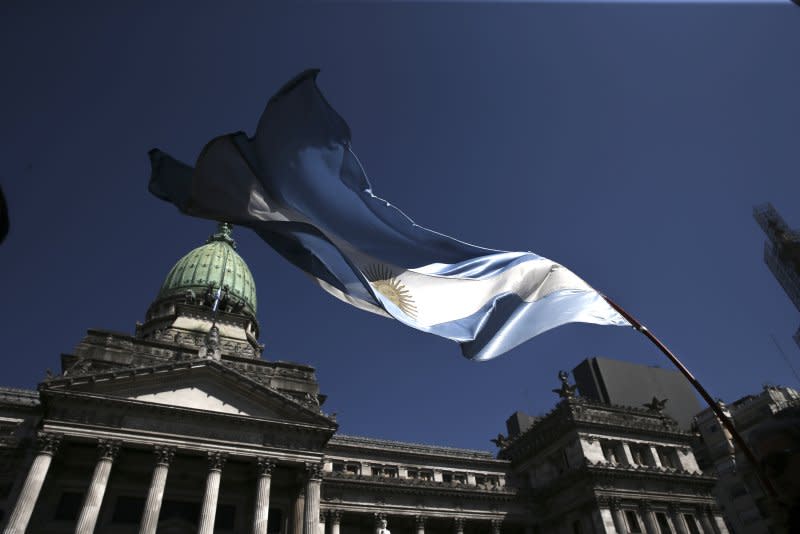Argentina Senate approves Milei's economic reforms; protesters arrested, hurt in capital

June 13 (UPI) -- Argentina advanced President Javier Milei's economic reforms as protestors clashed with police in the country's capital outside the National Congress building in opposition.
Lawmakers in Argentina's Senate voted 37-36 on Wednesday to approve the legislation after weeks of intense negotiations. It will now face a final vote in the country's lower legislative chamber where it is expected to pass.
"This is a triumph for the Argentine people and the first step towards recovering our greatness," Milei's office said in a statement after the vote, as he claimed it was "the most ambitious legislative reform in the past 40 years," his office said.
As head of the country's Senate chamber, Vice President Victoria Villarruel cast Wednesday's tie-breaking vote in favor of Milei's economic measures which many view as radical.
The first bill privatizes state-owned companies such as the country's state-run airline company, expands presidential authority on economic policy and supposedly gives incentives for investments. The second looks to lower Argentina's financial deficit. But lawmakers said no to Milei's original goal to restore income tax on wealthier taxpayers.

Argentina is in the middle of a 300% annual inflation rate with about half of the country's more than 47 millions citizens currently living in poverty.
The so-called "Ley de Bases" bill was described as "an accelerator, an enhancer of the recovery of the economic situation," the country's economy minister, Luis Caputo, said Tuesday.

But protestors believe that Milei's economic reforms will hurt millions of already-struggling Argentine citizens.
A car was set on fire in the streets of Buenos Aires as anti-riot police used tear gas, rubber bullets and water cannons to disperse crowds as stones and petrol bombs were thrown by protestors, according to reports.
Around 20 police officers reportedly were injured as at least 18 demonstrators were arrested Wednesday and nine hospitalized in scenes some said looked like a "battlefield" while police attempted to clear a nearby plaza.
The move was largely opposed by teachers, government employees, retirees, social organizations and labor unions in opposition to Milei's economic agenda, according to Buenos Aires Times.
"We cannot believe that in Argentina we are discussing a law that will put us back 100 years," Fabio Nunez, a 55-year-old lawyer who was protesting, said.
The new president, now six months in office, has yet to achieve the passage of any legislation since taking office and is seen as needing a legislative victory.
Milei's La Libertad Avanza party, which holds 7 of 72 seats in the Senate, is the minority in both Argentina's legislative chambers.
Lorena Giorgio, chief economist at Equilibra, said Milei's economic measures give Argentina "a better chance" of "a smooth exit" from the country's economic crisis, but that is "by no means assured.
Without any kind of action, "the next months would have been very turbulent both for markets and political conflicts."
Argentina in 2001 saw the collapse of convertability, which was the country's monetary stabilization plan that established parity between the U.S. dollar and the peso. The country has since gone through a series of economic hurdles.
Argentina had a 12.8% inflation rate around the time of November's presidential election won by Milei.
Milei's surprise victory last year followed a campaign focused on an economic overhaul that involved spending cuts, and closing Argentina's central bank to replace it with U.S. currency.
The International Monetary Fund in January reached an agreement with Milei's far-right populist government to provide $4.7 billion to help Argentina climb out of a stubborn financial crisis and shore up the country's economy.
Milei's government had "inherited an exceptionally challenging economic and social situation, with rising macroeconomic imbalances primarily reflecting inconsistent and expansionary policies, especially during the final quarters of last year," the IMF said in January.
In response to his election, Argentinian markets reacted to the shock result by sliding sharply lower while the Central Bank of the Argentine Republic devalued the peso by 22%, and increased the prime interest rate by 21 percentage points to 118% in an bid to calm financial turmoil and dissuade local investors to fleeing to the dollar.


